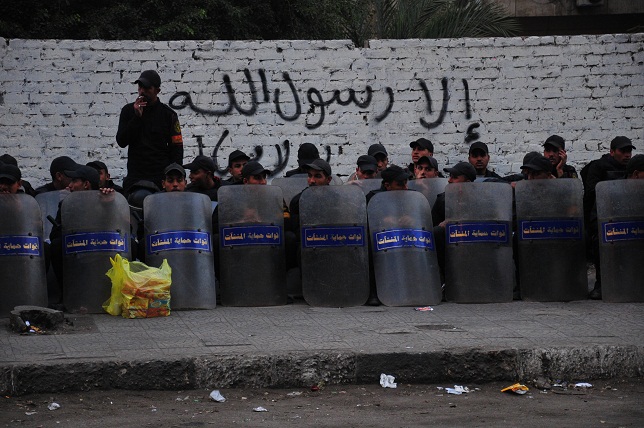CAIRO: Pleasure tourism always demands some sense of delusion.
Whether that might be deluding yourself into believing that the business phone-call will have miraculously been made by the time you get back, that somehow the sea-air will cure that mysterious ailment you’ve been suffering recently, or that the hot waiter you met on a beach in Sharm will sweep you off your feet and whisk you away to his private island.
But the biggest delusion of all, according to some, is that of “ecotourism, the neologistic cross-cultural genie delivering precarious wishes of “sustainability, “authentic experiences, “community commitment and “green practices.
In 2002, the same year declared “The year of Ecotourism by the United Nations, British professor Rosaleen Duffy, called ecotourism to the dock with her book “A Trip Too Far. According to Duffy, ecotourism is nothing more than a self-indulgent by-product of neo-liberalist consumer culture at its most hypocritical.
In a forthcoming book, “Nature Inbound: Conservation in a Neoliberal Age, she and her colleagues write: “Although ecotourism is often presented as significantly ‘different’ from mass tourism, it is far from unproblematic.
This is because it exists in a context of global neoliberalism, is part of it and entirely compatible with it.
Others have conjured up an impressive array of counter-buzzwords, such as ego-tourism, deco-tourism and green-washing, all conveying the elitist sport they perceive ecotourism to be. Some have even discerningly pointed out the relationship between luxury ecotourism and colonialism.
These accusations are critical, since they not only point to the misuse of the term itself, but preclude the viability of any reconciliation between ecological sustainability and tourism.
Education, a fundamental principle of ecotourism, seems the only way forward. And that can only come through direct experience. “You can’t fight something by being extreme, says Alaa Taher, geologist, nature photographer and manager of eco-travel company, InVision. “What needs to be done is to educate people, and raise the awareness level by showing people how beautiful these places are so they can protect them.
The airplane parody
But however true they may be, the genie has been let out of the bottle; and it’s not going back in. Unless in the case of a nuclear holocaust, the intrepid traveler is hardly going to exchange his plane ticket and sun-cream for a riveting travel-novel and the exotic foxgloves of his back-garden.
Mahmoud El-Kaissouni, environment advisor to the Minister of Tourism and vice chairman on the World Committee on Tourism Ethics, when presented with the paradox between plane-travel and ecotourism, gave a knowing smile.
“We mentioned this three months ago during a meeting on how to deal with tourism held in Oxford University. This was the number one accusation. The representatives from the Seychelles and the Maldives said, ‘are you expecting us to wait for tourism to come through the sea? We will be ruined.
Planes are the stream of life for us in our Islands. We will drown sooner or later due to rising sea levels but until then we need the planes.’ It’s a vicious circle, but there is no choice; people’s time is limited.
But plane travel isn’t the only rub mucking up the sparking holy eco-grail.
For eco-skeptics, those ‘eco-preneurs’ who make rich pickings from sensitive eco-systems are guilty of prostituting the term itself for the sake of a quick buck.
Without strict guidelines implemented by the private sector and supported by government bodies, the ecotourism sector will remain an unruly child with a complex personality. Vulnerable to abuse from ‘green-eyed greedies’, it could, in the future, turn out monstrous. On the other hand, if tamed, treated kindly, and invested with philosophical commitment, it can, according to its adherents, flourish.
Egyptian guidelines
Egypt has been pretty slow on the uptake of responding to global demands for a new approach to tourism. With the establishment of the Egyptian Federation of Tourist Chambers’ Ecotourism Committee, light appeared at the end of the smoky tunnel.
Three weeks ago, El-Kaissouni says, the Ministry of Tourism sent a letter initiating steps recognizing eco-lodges as hotels in their own right.
“We will only give them an eco-hotel license if they abide by certain rules during the building of the hotel. They will have to be built using the local material. The sewage system will have to be recycled and the garbage system has to be recycled.
Waste disposal is one of central factors posed to knock many self-styled eco-lodges both in Egypt and elsewhere, off their environmental pedestal; if you spot an incinerator on site, the chances are, your eco-lodge is about as green as a shot of liquified methane.
One lodge that does go some way to prove that ecotourism can be practiced faithfully is the Siwan Adrere Amellal. Using a system of waste water disposal researched at the University of Arizona, wetlands were prepared around the lodge. The waste travels through different grades of gravel through a filtration process not so different from a drinking water purification stage.
Thus, clear standardization that offers tourists a transparent image of their accommodation, will, in effect set an official definition for ecotourism. But this cardinal step is further impaired by the lack of cooperation between the Ministries of Environment and Tourism.
“We are one of the only countries in the world where there is no cooperation between the Ministry of Tourism and the Ministry of the Environment, said El-Kaissouni. “We have an environmental council established in 1995. They included in this council all members of most Egyptian ministries, including Petroleum and Agriculture. The only activity that was completely excluded was tourism. Why? Nobody knows. Despite the fact that we are the main source of income of the protected areas of Egypt, at least LE 20 million per year.
Until the government pulls its finger out and monitors the use of the advertising tool “ecotourism, creating eco-lodges and eco-travel experiences faithful to the principles of ecotourism, will remain subject to the integrity of individual investors and, perhaps most importantly, their motives.
Misguiding Labels
“We are not in the tourism business, we are in the business of sustainable development, says Mounir Neamatalla, managing director of the Egyptian consulting firm EQI and architect of Adrere Amellal. “EQI was founded in 1981 to influence and inspire the region into wider management of a natural resource base and engagement of local communities in leading its development challenges.
Ecotourism is a word that Neamatalla resents. It seems he shares sentiments with other concerned environmentalists, that the catchy suffix has become another piece of the meaningless jargon pie, a floating semantic that fails to connect meaningfully with the complex and diverse system it claims to represent.
“We are not an eco-lodge, we are a nature lodge. I feel that the term eco-lodge has been bastardized, so I don’t want to connect to it. I don’t want to dance to the tune of an emerging industry that has many variants.
“The tendency to cast labels is one of the biggest challenges we face. We are all disposed to it. We are heading towards uniformity, when nature teaches us, it is all about diversity. If you are really ecologically minded, you don’t speak about eco-lodges, you speak about lodging in accordance with certain values and principles.
One of the pitfalls of ecotourism is its very classification as tourism. Treating it as a separate field and failing to see the bigger picture has led eco-critics to slam the introduction of tourism to delicate, often geographically isolated areas. They claim that indigenous people, lured into low paid jobs by eco-preneurs and the oft-hammered capitalist slogans of economic individualism, abandon local industries that sustain the local environmental system.
As El-Kaissouni explains, this is a danger that has hit the oasis
of Bahariyya. “Most of the young men are moving into tourism and leaving agriculture.
This is starting to affect well-known products, for instance, the water melon, the palm trees and the olives. This is starting to be seriously affected. We’re hoping to execute an awareness campaign, to tell them how important it is they continue with their traditions. If they don’t, the oasis will die.
Investments, responsibilities
Neamatalla’s envisions an alternative more auspicious future that relies not on ecotourism per se but multiple initiatives that aim to maintain the balance of the local surroundings.
“It is multiple initiatives at a small level that builds economies, and that means everybody profits. The art of linkage and collaboration is part of the art of business success.
His reluctance to include EQI’s activities in Siwa under the tourism umbrella has to do with the factor of numbers. “A community is not just about people, it is the physical base of the oasis which can only sustain so much.
Adrere Amellal is sitting on 160 feddans. It has 40 rooms, but it could have 4,000 rooms. This natural spring gave us 40 rooms. It can’t give us more.
For environmentalists, to be virtuously green, tourism must remain limited to remain sustainable. The idea of keeping visitors to a minimum may sound like an oxymoron, but anything else just wouldn’t be eco.
As Neamatalla points out, everyone wants to be richer, and economic incentives will always be the main push behind investment, whether that may be tourism or otherwise. The key to guide that investment is respecting and working with natural resources.
It would be delusional to insist there isn’t a dose of delusion to ecotourism. But it would also be downright fanciful to imagine communities not taking matters into their own hands, cue Bahariyya. Sometimes letting nature take its course underestimates the desires of ‘simple’ people.
But then, realistically speaking, even if ecotourism projects ensure protection to protected areas, no eco-system can live in isolation as far as the debacle of global air pollution is concerned, not to mention the far-flung disasters of deforestation and desertification; just as no community can live isolated from the far-reaching tentacles of globalization.
Does this make ecotourism an ethically redundant concept? For puritans, yes, ecotourism is a contradiction in terms. It’s a sad fact that there’s a great deal of evidence to support the view that unless the pampered first world set its visions more locally, the end is nigh. But for other, more positive souls, whether deluded or just practical, the caravan of ecotourism comes bearing the seeds of the tree of life.

